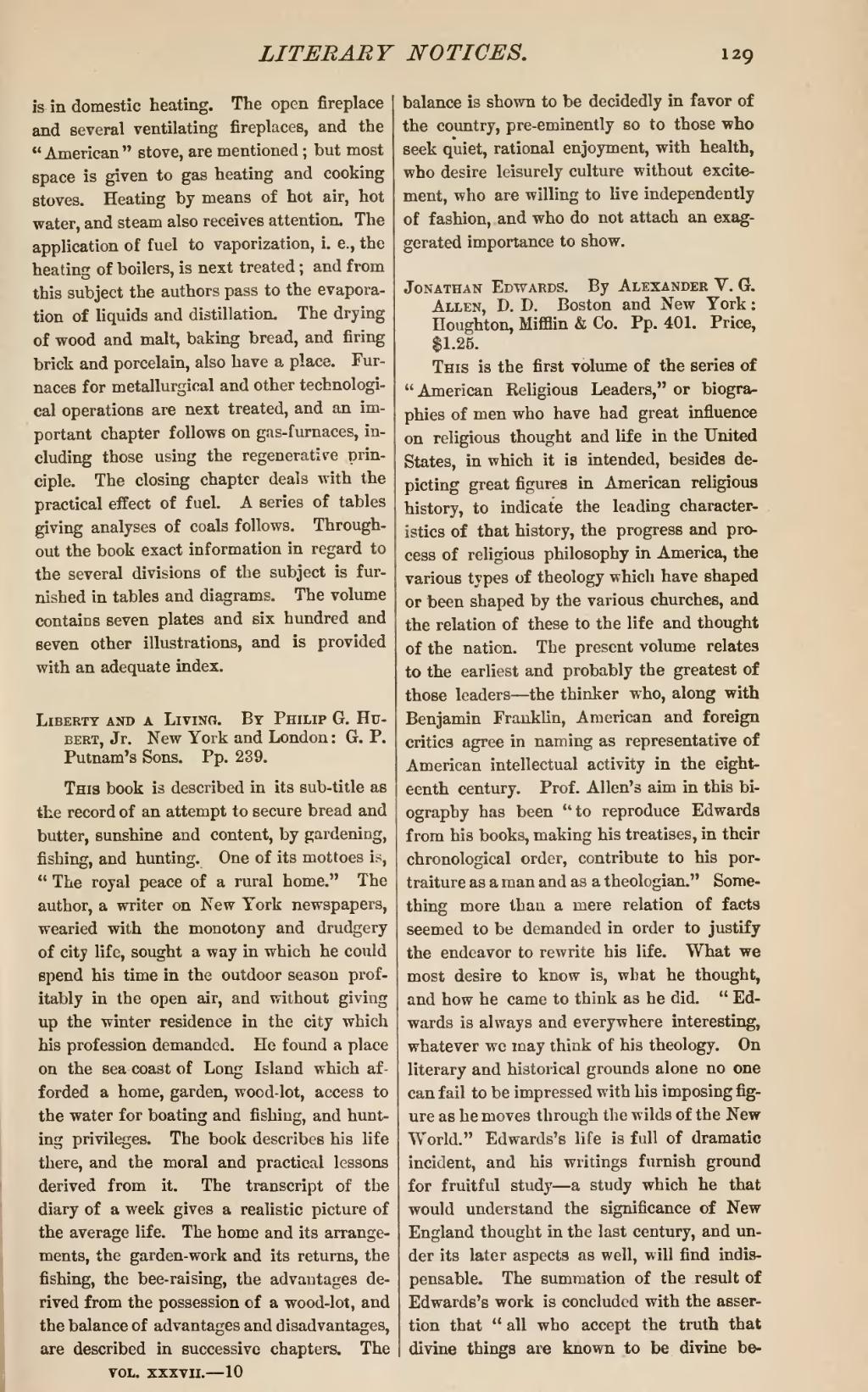is in domestic heating. The open fireplace and several ventilating fireplaces, and the "American" stove, are mentioned; but most space is given to gas heating and cooking stoves. Heating by means of hot air, hot water, and steam also receives attention. The application of fuel to vaporization, i. e., the heating of boilers, is next treated; and from this subject the authors pass to the evaporation of liquids and distillation. The drying of wood and malt, baking bread, and firing brick and porcelain, also have a place. Furnaces for metallurgical and other technological operations are next treated, and an important chapter follows on gas-furnaces, including those using the regenerative principle. The closing chapter deals with the practical effect of fuel. A series of tables giving analyses of coals follows. Throughout the book exact information in regard to the several divisions of the subject is furnished in tables and diagrams. The volume contains seven plates and six hundred and seven other illustrations, and is provided with an adequate index.
Liberty and a Living. By Philip G. Hubert, Jr. New York and London: G. P. Putnam's Sons. Pp. 239.
This book is described in its sub-title as the record of an attempt to secure bread and butter, sunshine and content, by gardening, fishing, and hunting. One of its mottoes is, "The royal peace of a rural home." The author, a writer on New York newspapers, wearied with the monotony and drudgery of city life, sought a way in which he could spend his time in the outdoor season profitably in the open air, and without giving up the winter residence in the city which his profession demanded. He found a place on the sea coast of Long Island which afforded a home, garden, wood-lot, access to the water for boating and fishing, and hunting privileges. The book describes his life there, and the moral and practical lessons derived from it. The transcript of the diary of a week gives a realistic picture of the average life. The home and its arrangements, the garden-work and its returns, the fishing, the bee-raising, the advantages derived from the possession of a wood-lot, and the balance of advantages and disadvantages, are described in successive chapters. The balance is shown to be decidedly in favor of the country, pre-eminently so to those who seek quiet, rational enjoyment, with health, who desire leisurely culture without excitement, who are willing to live independently of fashion, and who do not attach an exaggerated importance to show.
Jonathan Edwards. By Alexander V. G. Allen, D. D. Boston and New York: Houghton, Mifflin & Co. Pp. 401. Price, $1.25.
This is the first volume of the series of "American Religious Leaders," or biographies of men who have had great influence on religious thought and life in the United States, in which it is intended, besides depicting great figures in American religious history, to indicate the leading characteristics of that history, the progress and process of religious philosophy in America, the various types of theology which have shaped or been shaped by the various churches, and the relation of these to the life and thought of the nation. The present volume relates to the earliest and probably the greatest of those leaders—the thinker who, along with Benjamin Franklin, American and foreign critics agree in naming as representative of American intellectual activity in the eighteenth century. Prof. Allen's aim in this biography has been "to reproduce Edwards from his books, making his treatises, in their chronological order, contribute to his portraiture as a man and as a theologian." Something more than a mere relation of facts seemed to be demanded in order to justify the endeavor to rewrite his life. What we most desire to know is, what he thought, and how he came to think as he did. "Edwards is always and everywhere interesting, whatever we may think of his theology. On literary and historical grounds alone no one can fail to be impressed with his imposing figure as he moves through the wilds of the New World." Edwards's life is full of dramatic incident, and his writings furnish ground for fruitful study—a study which he that would understand the significance of New England thought in the last century, and under its later aspects as well, will find indispensable. The summation of the result of Edwards's work is concluded with the assertion that "all who accept the truth that divine things are known to be divine be-
